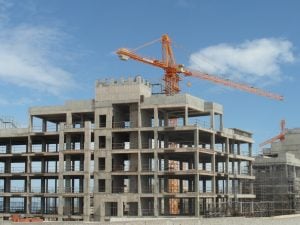By Sami Zaptia.

London, 11 October 2018:
Libya’s Tripoli-based government has revealed that it will activate its stalled housing projects using local companies, as part of its new economic reform plan.
The revelation came from Ahmed Maetig, deputy head of Libya’s internationally-recognized Presidency Council (PC), during a Tripoli forum on the government’s new economic reform plan on Tuesday.
Maetig stressed the importance of the economic reforms and the initial phases centred around the imposition of a tax/levy on the sale of foreign currency for private use.
This policy is hoped to bring in liquidity to the country’s drained banking sector while reducing the black-market exchange rate. The foreign exchange revenues will also be used to reduce the government’s recurring budget deficit.
The new economic reform plan also involves Libya’s local banks offering loans to local companies wishing to complete some of the country’s plethora of stalled housing projects.
Maetig stressed that only some stalled housing projects will be reactivated: “where it was possible”. He did not give any further details, but said more would be revealed by December.
He did say that local companies were free to go into joint ventures with foreign companies.
More importantly, Maetig said that it would be left to banks to decide which stalled housing projects would be reactivated – as they would be providing the financing to the construction companies.
It will be recalled that previously Libyan governments had formed committees to attempt to assess the viability of stalled projects. By placing the responsibility on banks, the government can avoid having to make a political decision.
Maetig said that he Libyan government would act as guarantors of the loans given by local banks.
Maetig did not make any comment regarding the status of foreign contractors viz-a-viz some of Libyas stalled housing projects. Nor did he clarify if any of the stalled projects planned for reactivation were started by foreign contractors.
It is noteworthy that the Libyan government has prioritized incomplete housing projects above many other types of stalled projects.
This political decision reflects the country-wide housing deficit and the confidence that there will be no difficulty in selling any completed housing units.
It also reflects the social importance of housing. The shortage of housing is seen as the biggest barriers to marriage by young couples.
https://www.libyaherald.com/2018/10/11/cbl-not-delaying-economic-reforms-pcs-maetig/
https://www.libyaherald.com/2018/03/06/libyas-stalled-us-110-bn-22000-contract-projects-to-be-reviewed-again/
https://www.libyaherald.com/2017/01/11/gna-forms-committee-to-review-prioritize-stalled-projects-within-10-days-for-11-sectors/










